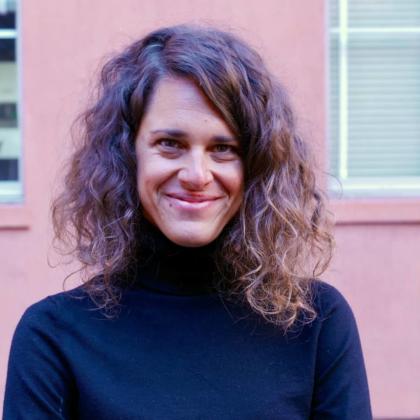People / Faculty

Lilla Balint
Assistant Professor of German
Research Areas
Lilla Balint specializes in postwar and contemporary German literature, culture, and critical thought, with an emphasis on post-1989 literary production. Her research is transnational and comparative in orientation, focusing on the long history of narrative forms, from the novel to emergent forms of digital writing; literary and narrative theory; aesthetics and politics; and critical theory.
Office:
5327 Dwinelle
Contact:
Recent courses
“Ideas of Education: From Goethe to Dear White People”, “Robots, Monsters, Operating Systems: Literature and the Technological Imagination”, “Literature and its Lectures: The Poetikvorlesung”, “Literature in the Digital Age”, “Time in the Contemporary”
Biography
Lilla Balint specializes in postwar and contemporary German literature, culture, and critical thought, with an emphasis on post-1989 literary production. Her research is transnational and comparative in orientation, focusing on the long history of narrative forms, from the novel to emergent forms of digital writing; literary and narrative theory; aesthetics and politics; and critical theory.
Balint is currently completing her book manuscript, “After 1989: History, Temporality, and the Contemporary,” that attends to questions of aesthetic form to theorize ideas of historicity that emerge in literature from Central Europe after the fall of the Berlin Wall. The comparative study traces writers’ engagement with and resistance to narratives such as the end of history, presentism, and the Anthropocene. Balint’s writing has appeared in Critical Quarterly, German Quarterly, Gegenwartsliteratur: A German Studies Yearbook, Studies in Twentieth & Twenty-First Century Literature, Telos, among others.
Other projects include an edited volume on German author Judith Schalansky for text+kritik (with Leonhard Herrmann), forthcoming in fall 2024. As the first journal-length engagement with Schalansky’s multi-faceted oeuvre as writer, book designer, and book series editor, the volume comprises essays on topics ranging from extinction and the Anthropocene to historicity and the materiality of the book. Balint’s other editorial project (with Arne Höcker) is a special issue on contemporary literature that examines the contemporary not primarily as a temporal phenomenon but as a textual and critical practice. Invested in the public humanities, Balint has organized and moderated events with various authors for San Francisco’s literary festival LitQuake, the Goethe Institute, the German Historical Institute in Washington, D.C., and the Archives of Migration series at UC Berkeley’s Department of German.
Balint’s research has been supported by the Hellman Family Foundation; the Humanities Research Fellowship; and the Townsend Center for the Humanities at UC Berkeley. At Berkeley, Balint is also affiliated with the Department of Slavic Languages and Literatures, the Center for Jewish Studies, and the Institute for European Studies.
Balint received her Ph.D. in German Studies from Stanford University. Before joining the faculty at Berkeley, she held faculty appointments in the Department of German and Russian at Vanderbilt University and at Hamilton College.
Selected publications
Edited Volumes
Balint, Lilla, and Leonhard Herrmann, editors. Judith Schalansky. Edition Text+Kritik, forthcoming in fall 2024
Articles
“From Hard Slavic Endings to Making Things Possible: The Political in Saša Stanišić’s Prose.” Peripheral Europes, special issue of Critical Quarterly, edited by Benjamin Kohlmann and Ivana Perica, vol. 65, no. 4, 2023, 40-58. (with Djordje Popović)
“Migration Meets Bildung: Jenny Erpenbeck’s Go, Went, Gone.” Studies in 20th& 21st Century Literature, vol. 46, no. 1, 2022, Article 7. (with Landon Reitz)
“Rhytmus, Form, Kritik: Kathrin Rögglas wir schlafen nicht.” Literatur nach der Digitalisierung: Zeitkonzepte und Gegenwartsdiagnosen, edited by Elias Kreuzmair and Eckhard Schumacher, De Gruyter, 2021, 125-146 (German translation of “Rhythm, Form, Critique: Kathrin Röggla’s wir schlafen nicht”, appeared in English in German Quarterly, 2020).
“The Contemporary as Multilingual: Tomer Gardi’s broken german.” Gegenwartsliteratur: A German Studies Yearbook, no. 20, 2021, 233-55. (with Sarah Koellner)
“Parallelen kreuz und quer: Péter Nádas’ Parallelgeschichten.” Die Wiederholung, no. 11, Winter 2020.
“Rhythm, Form, Critique: Kathrin Röggla’s wir schlafen nicht.” German Quarterly, vol. 93, no. 4, Fall 2020, 503-18.
“Traces, Memories: On Péter Nádas.” Disseminating Jewish Literatures: Knowledge, Research, Curricula, edited by Susanne Zepp et al, De Gruyter, 2020, 269-280.
“Eine Poetik des kleinen Raumes auf Twitter: Claudia Vamvas’ Sitze im Bus,” Variations, no. 27, edited by Philippe Haensler et al. (issue delayed due to Covid-19, forthcoming 2024)
“’Dann bleibt mir noch eine Stunde, in der ich es nicht schaffe irgend etwas Sinnvolles zu tun, und ich mache den Fernseher an’: Konzeptionen des medialen Selbst bei Wolfgang Herrndorf.“ Germanistenscheiß: Beiträge zur Werkpolitik Wolfgang Herrndorfs, edited by Matthias Lorenz, Frank & Timme Verlag, 2019, 181-202.
“Transnational Strategies and Jewish Writing: Péter Nádas’s Parallel Stories as a European Novel.” Yearbook for European Jewish Literature Studies, vol. 5, 2018, 231-246.
“Sickness unto Death in the Age of 24/7: Wolfgang Herrndorf’s Arbeit und Struktur.” On 24/7: Neoliberalism and the Undoing of Time, special issue of Studies in 20th& 21st Century Literature, edited by Necia Chronister and Lutz Koepnick, vol. 40, no. 2, 2016.
“‘Laßt uns doch mal wieder einen Nazi verspeisen’: Unverdaute deutsch-jüdische Geschichte bei Barbara Honigmann.” Ordre et désordre à table, Germanica, no. 57, 2015, pp. 83-97.
Book Reviews and Review Essays
“Schreibenlassen” by Hannes Bajohr. Gegenwartsliteratur: A German Studies Yearbook, no. 22, 2023, 313-316.
“Fictions of Legibility: The Human Face and Body in Modern German Novels from Sophie von La Roche to Alfred Döblin” by Gabriela Stoicea. Studies in the Novel, vol. 53, no. 4, 2021, 442-444.
“Not a Novel: A Memoir in Pieces” by Jenny Erpenbeck. Gegenwartsliteratur: A German Studies Yearbook, no. 20, 2021, 373-75.
“Sincerity after Communism” by Ellen Rutten. Slavic and East European Journal, vol. 64, no. 1, 2020, 122-123.
“With and Against Marx: Ágnes Heller’s Philosophy.” Telos, Fall 2020, 189-191.
“Destruction and Sorrow beneath the Heavens” by László Krasznahorkai. Slavic and East European Journal, vol. 61, no. 4, 2017, 921-922.
